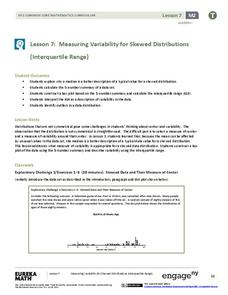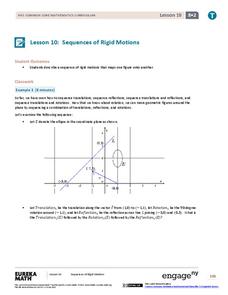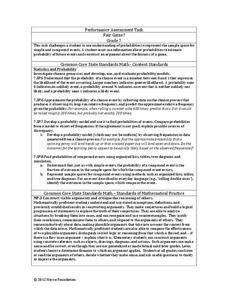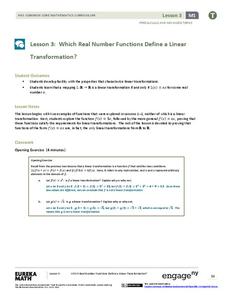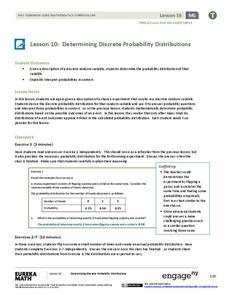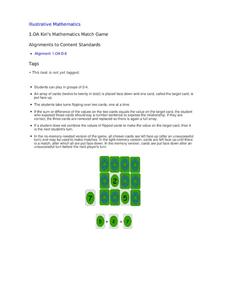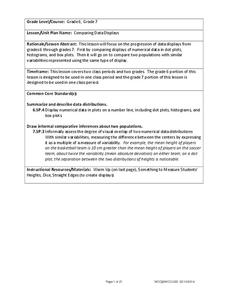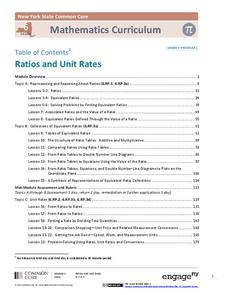EngageNY
Decimal Expansions of Fractions, Part 1
Is it possible to add infinitely long decimals? As pupils complete the examples in the ninth lesson of this 25-part series, they determine that adding these decimals cannot be done without error. Their task is then to determine the size...
EngageNY
Measuring Variability for Skewed Distributions (Interquartile Range)
Should the standard deviation be used for all distributions? Pupils know that the median is a better description of the center for skewed distributions; therefore, they will need a variability measure about the median for those...
EngageNY
Sequences of Rigid Motions
Examine the various rigid transformations and recognize sequences of these transformations. The lesson asks learners to perform sequences of rotations, reflections, and translations. Individuals also describe a sequence that results in...
Noyce Foundation
Fair Game?
The game should be fair at all costs. The mini-assessment revolves around the ability to use probabilities to determine whether a game is fair. Individuals determine compound events to calculate simple probabilities and make...
EngageNY
Angle Sum of a Triangle
Prove the Angle Sum Theorem of a triangle using parallel line and transversal angle relationships. Pupils create a triangle from parallel lines and transversals. They find angle measures to show that the angles of a triangle must total...
EngageNY
Solving Equations with Radicals
Show learners how to develop a procedure for solving equations using radicals with the fifth instructional activity of the 25-part module that challenges learners to use properties to solve multi-step quadratic and cubic equations....
EngageNY
The Power of Algebra—Finding Primes
Banks are responsible for keeping our financial information safe. Mathematics is what allows them to do just that! Pupils learn the math behind the cryptography that banks rely on. Using polynomial identities, learners reproduce the...
EngageNY
Solving Problems by Finding Equivalent Ratios
Combine total quantities and equivalent ratios in problem solving. The fifth lesson in a series of 29 presents problems that can be solved using equivalent ratios. Pupils use part-to-part ratios and either sums or differences of the...
EngageNY
Bacteria and Exponential Growth
It's scary how fast bacteria can grow — exponentially. Class members solve exponential equations, including those modeling bacteria and population growth. Lesson emphasizes numerical approaches rather than graphical or algebraic.
EngageNY
Which Real Number Functions Define a Linear Transformation?
Not all linear functions are linear transformations, only those that go through the origin. The third lesson in the 32-part unit proves that linear transformations are of the form f(x) = ax. The lesson plan takes another look at examples...
EngageNY
An Appearance of Complex Numbers 1
Complex solutions are not always simple to find. In the fourth instructional activity of the unit, the class extends their understanding of complex numbers in order to solve and check the solutions to a rational equation presented in the...
EngageNY
Determining Discrete Probability Distributions 2
Investigate how long-run outcomes approach the calculated probability distribution. The 10th installment of a 21-part module continues work on probability distributions from the previous lesson. They pool class data to see how conducting...
EngageNY
Addition and Subtraction Formulas 1
Show budding mathematicans how to find the sine of pi over 12. The third lesson in a series of 16 introduces the addition and subtraction formulas for trigonometric functions. Class members derive the formulas using the distance...
Chicago Teachers Union Quest Center
Factored Form of a Quadratic Function
Build upon linear functions to learn about quadratics. The lesson introduces the concept of zeros for quadratic functions and makes the connection to the linear factors of the function. It presents quadratics in both graphical and...
Illustrative Mathematics
The Napping House
How many people and animals can cram into a single bed? Find out with this cross-curricular math and language arts lesson. Following along with a reading of the children's book The Napping House by Audrey Wood, young mathematicians...
West Contra Costa Unified School District
Adding by finding 10's
Count with ten frames in a first grade addition lesson. Kids determine how to identify numbers on a number line, as well as with ten frames, and complete ten frames to show their answers in several addition problems.
Scholastic
Study Jams! Line Plots
Data analysts are guided through the arrangement of whole-number data onto a line plot by listening and viewing a high-quality, animated, and narrated set of slides.
BioEd Online
Good Stress for Your Body
Stress the importance of the different types of pressure our mind and body experience in a instructional activity about how certain types of stress are actually necessary and good for our bodies. As astronauts and people with injuries...
Illustrative Mathematics
Kiri's Mathematics Match Game
Learning math is so much more fun when it involves playing games. Following the rules of the classic game Memory, young mathematicians flip over two cards at a time as they look for numbers whose sum or difference is equal to the value...
West Contra Costa Unified School District
Comparing Data Displays
There is so much more to data than just numbers, and this resource has learners use three methods of comparing data in a multi-faceted instructional activity. The 21-page packet includes a warm-up, examples, an activity, and...
Mathalicious
XBOX Xpotential
Touchdown! This is an exponentially insightful instructional activity that explores the growth of football games with different video game consoles. Class members discuss whether the increase of mergahertz can be described as linear...
EngageNY
Ratios and Unit Rates
This turn-key unit on ratios and unit rates walks through a 30-lesson unit on teaching proportional reasoning, with each lesson broken into detailed teaching notes and time allotments for all parts. An unbelievable resource when taken...
Federal Reserve Bank
So How Much Are You Really Paying for that Loan?
Loans are rarely provided without a cost. Pupils evaluate the high cost of using a payday loan or payday advance through discussion and worksheets, and finally work in groups to develop short public service announcements...
Mathalicious
Domino Effect
Carryout the lesson to determine the cost of pizza toppings from a Domino's Pizza® website while creating a linear model. Learners look through real data—and even create their own pizza—to determine the cost of each topping. They...



